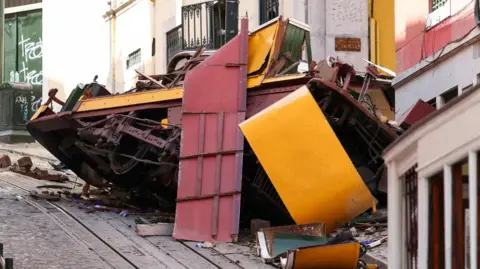As Sonia Silva prepared to leave work on Wednesday evening, she was asked by a colleague to help with a quick task.
It meant she missed her regular funicular ride down the hill with a work friend on their commute home from the office in the centre of Lisbon.
When she arrived at the stop a short while later, the funicular had crashed and her friend was dead.
When I got there, it was a tragedy, she said.
Sixteen people were killed on Wednesday evening in Lisbon when its iconic 140-year-old Glória funicular derailed and crashed into a building. The Portuguese prime minister has described it as one of the biggest human tragedies of our recent history.
Many of those killed were foreign nationals, including three British people whose identities have not yet been announced. Five of the dead were Portuguese, with four working at the Santa Casa da Misericórdia charity at the top of the hill.
A service was held on Friday in a church next to the charity's headquarters, honouring the workers killed in the crash, attended by numerous mourners.
As they left, colleagues wept and supported each other, trying to make sense of the tragedy. Sonia said she had worked at the charity for eight years and used the funicular daily. She described the emotional turmoil of losing a close colleague and friend.
Others expressed feelings of devastation and anger over the loss, highlighting how many of them shared a similar route home and felt a sense of safety in using public transport.
With an investigation underway into the cause of the crash, community members speculated about overcrowding and maintenance issues contributing to the disaster.
One survivor remarked, I've told everyone I'm not going to use it anymore, capturing the fear and uncertainty now felt by many regular commuters.






















